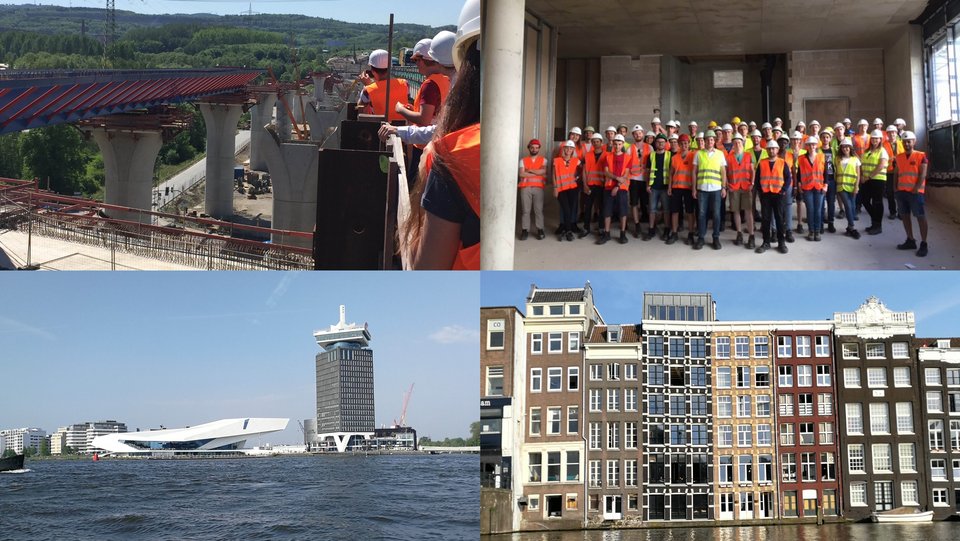Modern infrastructures, the intensive use of space in conurbations and cities and the ever-increasing revitalisation of existing buildings place high demands on the training of engineers. The Master's programme in Structural Engineering is an application-oriented course in the classical field of work of civil engineers* and includes the design, construction and calculation of a wide range of civil engineering structures. With our Master's programme we prepare you optimally for these tasks. No matter whether you want to work later in an engineering office, in a construction company, in administration or in the field of research. The master's degree course prepares you optimally for taking on management tasks in the field of planning and execution of complex building projects.
The Master's programme is offered on a full-time and part-time basis and thus offers the opportunity to meet personal needs and expectations.
July 15 (winter semester)
15 January (summer semester)
3 Semester Vollzeit, 5 Teilzeit
Master of Engineering (M.Eng.)
Structural engineering is the classic field of activity of civil engineers and includes the design, construction and calculation of buildings and civil engineering structures. These include residential buildings, bridges, high-rise buildings, office buildings, stadiums, but increasingly also buildings from the energy sector. All these different structures must be planned and built so that safe, economical and increasingly sustainable use is possible. The Master's degree course in Structural Engineering combines all these aspects in an interesting and varied range of courses. Whether structural analysis, construction management or the application of numerical simulation methods - the students of the master's course are imparted extensive knowledge.
The professional field of structural engineering is developing more and more in the field of digital construction (BIM) or in the field of construction in existing buildings. These current topics are also covered by the course of studies, which imparts up-to-date knowledge and thus provides optimal preparation for professional practice.
In addition to the classical areas of structural engineering (solid construction, steel construction, timber construction), the main focus of the course is on structural mechanics, construction in existing buildings, digital construction (BIM) and bridge construction. Topics such as glass construction, building law, geotechnics, economics and management complete the content. Regular site visits and an excursion lasting several days round off the study programme. A part of the course offering is linked to the master's degree course in geotechnical engineering/tunnelling.
- Structural mechanics (statics and dynamics)
- Solid construction, steel construction, timber construction
- construction in existing contexts
- Digital construction (BIM) and construction management
- Bridge construction
- Glass construction
Structural Mechanics
Structural mechanics forms the basis for the analysis of the load-bearing behaviour of buildings. Building on the contents of mechanics and structural analysis in the bachelor's degree, the master's degree course primarily teaches the theory and application of the Finite Element Method (FEM), so that complex components and structures can be simulated and calculated. However, the structural mechanics in the master also includes the field of structural dynamics. Knowledge of the dynamic behaviour of structures is indispensable for building in earthquake zones and for recording the wind effects on slender structures (e.g. towers, masts, wide-span bridges).
Founded in 1832, the HFT Stuttgart is traditionally and for many years now closely linked with regional construction companies and engineering offices, thus guaranteeing a continuous exchange between theory and practice. The location of the university, in the Stuttgart metropolitan region with its lively building activities, offers the opportunity to relate to building practice on concrete building projects and schemes, e.g. in the form of excursions. Several expert lecturers from companies and engineering offices with proven expertise in their fields guarantee a constant application focus and orientation towards practical professional requirements.
The prerequisite for admission to the Master's programme is an above-average degree with a standard period of study of at least three years at a German university or comparable foreign university in the field of civil engineering. Good German and English language skills are required. Desirable and advantageous is a subject-related professional activity as a civil engineer in an engineering or planning office or technical office of a construction company. Applicants with a Bachelor's degree must prove that they have earned at least 210 credit points according to ECTS (CP) from a civil engineering course of study.
The revitalisation of existing building fabric, the intensive use of space in conurbations and modern infrastructure measures today place ever increasing demands on technically sound, economical and environmentally sound planning and construction. The demands and the need for well-trained civil engineers, especially in classical structural engineering, are constantly increasing. In the Master's programme in Structural Engineering, the focus is on building in existing structures, economic project management and, last but not least, the design of infrastructure measures. The degree prepares you for the current requirements in practice, it qualifies you for access to the higher civil engineering administration service and for a doctorate.
Civil engineers* with technical and methodological competence in geotechnics are in great demand on the labour market. The professional fields of activity are thematically extremely versatile and also offer a wide range of possible employers, from planning offices to construction companies, public authorities or self-employment. The degree "Master of Engineering" qualifies for higher service and, in cooperation with a university, for doctoral studies.
![[Image: pixabay.com] Eine Glaskuppel](/fileadmin/Dateien/Bauingenieurwesen/_processed_/0/9/csm_MA-KI-modern-architecture_1bed5165ae.jpg)
![[Image: pixabay.com] Das Mercedes-Benz Museum](/fileadmin/Dateien/Bauingenieurwesen/_processed_/e/7/csm_MA-KI-mercedes_f4ab09f853.jpg)
![[Image: pixabay.com] Impressionen zu Konstruktionen](/fileadmin/Dateien/Bauingenieurwesen/_processed_/f/f/csm_MA-KI-konstruktionen_0576bd8941.jpg)
![[Image: pixabay.com] Impressionen zu Konstruktionen](/fileadmin/Dateien/Bauingenieurwesen/_processed_/3/4/csm_MA-KI-gebaeudekonstruktionen_07d8af7ba5.jpg)
![[Image: pixabay.com] Zwei Studentinnen legen sich gegenseitig dem Arm um die Schulter](/fileadmin/Dateien/Bauingenieurwesen/_processed_/5/f/csm_MA-KI-studentinnen_2ed5e5fc00.jpg)

![[Image: pixabay.com] Impressionen zur Bewerbung](/fileadmin/Dateien/Bauingenieurwesen/_processed_/1/a/csm_MA-KI-bewerbung_76fd208398.jpg)
![[Image: pixabay.com] Darstellung einer Frau, die in Richtung des Schriftzugs "Job" springt](/fileadmin/Dateien/Bauingenieurwesen/_processed_/6/2/csm_MA-KI-sprung_9bcea10de5.jpg)